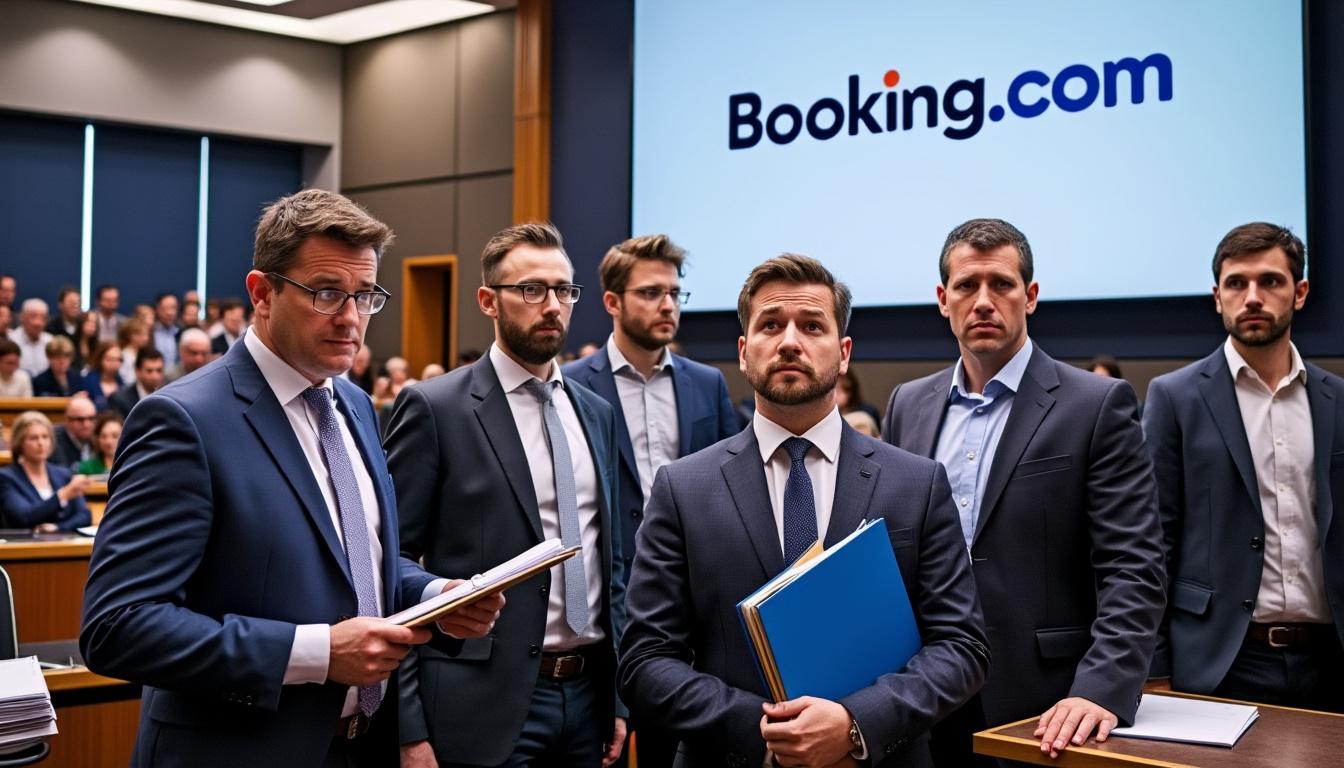A collective wave of discontent among European hotel owners has reached a crescendo, resulting in a historic legal confrontation against Booking.com. This unprecedented alliance, consisting of over 25 national hotel associations, has converged in the Netherlands to challenge the controversial pricing strategies employed by the online travel giant. The crux of this legal action lies in the use of price parity clauses, which have long required hotels to maintain the same or lower prices on Booking.com’s platform compared to their own websites or other booking channels. This contentious issue not only affects hotels directly but raises significant questions surrounding online marketplace dynamics and competition laws across Europe.
Understanding the Price Parity Clauses: A Historical Context
Price parity clauses have been a contentious issue in the hospitality sector for several years. Initially, these clauses were introduced under the premise of ensuring competitive equality among various online travel agencies (OTAs) and hotel operators. The idea was to prevent practices such as “free-riding,” where online platforms might benefit from lower prices offered by hotels on their own sites while not bearing the marketing costs associated with attracting customers.
However, the landscape has shifted dramatically, especially in light of the recent ruling by the European Court of Justice (ECJ) in September 2024. This ruling declared that such clauses may constitute illegal restraints of trade under EU competition law. Specifically, this legal precedent emerged from a case involving German hotels, which has now served as a beacon of hope for the wider European hotel community.
Within the context of this lawsuit, hotel owners argue that these pricing mechanisms suppress competition and ultimately harm consumers by keeping prices artificially high. Additionally, these clauses have made it challenging for hotels to differentiate their offerings effectively, as they are constrained by the pricing policies set forth by platforms like Booking.com.
- Historical Overview of Price Parity Clauses
- Introduced to prevent free-riding by OTAs
- Allegations of anti-competitive behavior
- Impact on consumer pricing dynamics
Various hotel chains, including global brands such as Hilton, Marriott, and Accor, are attentively observing these developments. The ramifications of the lawsuit could redefine their relationships with OTAs in the foreseeable future. Similarly, this case may also influence how independent hotels harness distribution channels to maximize their profitability.

National Associations Mobilize Against a Common Challenger
The coordination of this legal action is spearheaded by the Stichting Hotel Claims Alliance, which unifies hotel associations from across Europe. This initiative represents not just a legal stance but also a fundamental shift in how the European hotel sector perceives its power dynamics with booking platforms. The backing of influential organizations such as HOTREC, which advocates for the hospitality sector, lends substantial credibility to these claims.
The collective legal landscape is unprecedented; participating hotels range from local bed-and-breakfast establishments to well-known chains such as Radisson and Hyatt. Collectively, these establishments argue that their sustained financial losses due to Booking.com’s pricing practices deserve appropriate compensation. An essential aspect of this action is the clear call for transparency and fairness in the interactions between hotels and online travel agencies.
- Key Players in the Legal Action
- Stichting Hotel Claims Alliance: Coordinating entity
- HOTREC: Strong industry backing
- Participating Hotel Chains: Radisson, Hyatt, Best Western
Hotels that registered with this legal action have until July 31, 2025, to join the movement, potentially opening the gates for a much larger pool of claimants. The ambition is not solely to win compensation for damages but also to reform the very foundations of how booking platforms engage with hotel operators.
The Legal Framework: How Does it Affect European Hotels?
This lawsuit stands at a uniquely pivotal moment in European jurisprudence concerning competition and market ethics. With the ECJ’s ruling acting as a key underpinning for the hotels’ arguments against Booking.com, the legal framework for this case could have far-reaching implications. Beyond individual compensations, this action is poised to redefine the operational protocols for all OTAs operating in Europe.
From a legislative standpoint, the challenge stems from the need to maintain competitive fairness within the hospitality sector. As various countries evolve in their regulatory frameworks around e-commerce, the outcome of this legal confrontation may prompt reevaluation of existing laws. Furthermore, if the plaintiffs succeed, it could compel OTAs, including giants like Expedia and Airbnb, to reconsider their current operational methodologies.
| Legal Framework Implications | Potential Outcomes |
|---|---|
| Reassessment of competition laws | Regulatory changes around pricing practices for OTAs |
| Greater autonomy for hotel pricing | Enhanced control for hotels in setting rates |
| Long-term effects on consumer pricing | Potentially lower prices for end customers |
For many hotel owners, the message is clear: the pricing disparity enforced by booking platforms has to change. The legal action emphasizes the urgency with which hoteliers approach this issue. They argue that competitive distortions directly harm their businesses and strain their ability to attract guests.
Strategies for Hotel Owners Amid Legal Turmoil
As litigation unfolds, hotel owners must adapt strategically to navigate the complexities of the evolving landscape. Now more than ever, hoteliers are encouraged to devise innovative marketing strategies, diversify distribution channels, and build direct customer relationships. Developing strong branding can also play a pivotal role in establishing a loyal customer base, crucial for combating OTA dominance.
Meanwhile, hotel owners are turning to direct booking incentives, attractive packages, and exclusive offers to encourage guests to book through their own channels rather than third-party platforms. The greater the value proposition provided directly by hotels, the more compelling the argument against reliance on OTAs. Additionally, employing data analytics to understand consumer behavior can enhance pricing strategies and promotional activities.
- Recommended Strategies
- Enhancing direct booking channels
- Creating exclusive offers or loyalty programs
- Leveraging social media for direct engagement
In this legal environment, the importance of collaboration among hotel owners cannot be understated. Many are finding strength by partnering with local businesses to provide unique experiences that draw visitors. Such partnerships potentially enhance visibility and transform hotel offerings from mere accommodation to experiences valued by guests.
Ultimately, the ongoing challenge presents a prime opportunity for hoteliers to reassess their business models. By placing emphasis on value-driven operations and direct engagement with customers, the potential fallout from the legal action could become an opportunity rather than a threat.

The Implications of Consumer Behavior and Market Dynamics
The ripple effects of this ongoing lawsuit are likely to extend beyond the immediate concerns of hotel owners. Consumer behavior patterns, shaped by the accessibility of online booking platforms, could witness a notable shift as hoteliers regain pricing autonomy. As consumers become aware of the implications of the pricing practices inherent to OTAs, their preferences may lean toward more ethical pricing strategies.
Understanding that their purchasing habits impact the industry, consumers might prioritize hotels offering competitive exclusives when booking. This evolving dynamic portrays a new era of conscious consumption within the hospitality framework. Should the lawsuit succeed, it paves the way for significant disruptions to the current order of online bookings, leading to renewed interest in booking directly with hotels that provide enhanced value for guests.
Research has shown that consumers often gravitate toward booking through platforms due to perceived convenience and competitive pricing. However, should numerous hotels begin marketing value-added packages directly to consumers, the game may change. The expectation of lower prices—made possible by hotels regaining control over their pricing strategies—could redefine what is deemed acceptable within the travel industry.
| Consumer Preferences Shift | Expectations from Hotels |
|---|---|
| Risks associated with booking through intermediaries | Stronger value propositions on direct bookings |
| Desire for more transparent pricing models | Greater emphasis on customer service and personalized offers |
| Growing support for local and independent businesses | Partnerships that enhance local experiences |
In conclusion, the implications of this legal challenge transcend the realm of hotels alone; they also encompass the behavior and expectations of consumers who engage with the hospitality market. It is crucial for hoteliers to remain attuned to these shifts if they wish to thrive in what could be an entirely new paradigm for customer engagement.
